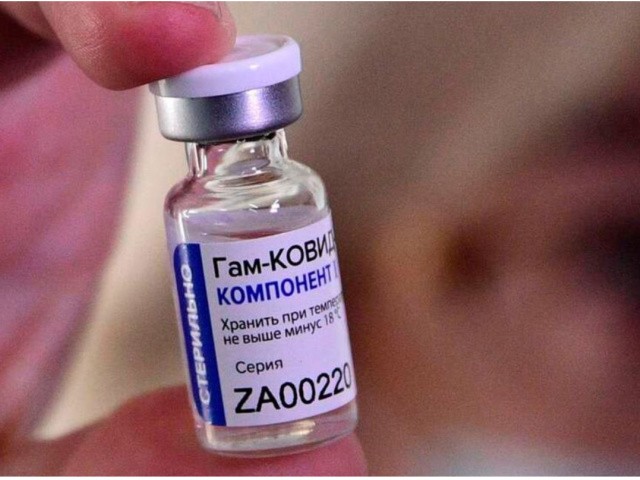A spokesman for the Taliban terror group, which seized control of Afghanistan in August, said Friday the organization is “interested” in receiving Chinese coronavirus vaccines from Russia to administer to Afghan citizens, Russia’s state-owned TASS news agency reported.
“We’re interested in receiving vaccines from Russia as well as from any other country, which wishes to render assistance to us in this field,” Qalandar Ibad, the Taliban-appointed Health Minister for Afghanistan’s interim government, told reporters on October 29.
Ibad likely referred to Sputnik V, Russia’s first state-made vaccine against the Chinese coronavirus. Moscow has since claimed to have successfully produced three additional coronavirus vaccines since Russia’s state-run Gamaleya Research Institute of Epidemiology and Microbiology announced Sputnik V in August 2020.
Sputnik V, Russia’s most widely produced and exported coronavirus vaccine, faces ongoing obstacles in gaining worldwide use approval by established medical associations. The European Union (E.U.)’s official drug regulator, the European Medicines Agency (EMA), has yet to approve Sputnik V for use in the E.U. because, according to Reuters, Moscow has failed to provide the body with sufficient data demonstrating the vaccine’s safety and effectiveness.
“EMA asked for a more complete dossier on production, details of how the vaccine is produced. When they have this dossier they will also be able to understand where to ask for inspections,” Reuters quoted an unnamed source as saying on October 21.

A medical worker displays a vial with Sputnik V vaccine during the vaccination of medics at a clinic in the far eastern city of Vladivostok on December 15, 2020. AFP
The EMA launched a formal review of Sputnik V in March but does not expect to finish its analysis of the vaccine until at least the first quarter of 2021.
“If the required data is received by the end of November, then the regulators may well decide in the first quarter of next year,” according to Reuters’ source “with knowledge of the matter.”
The Lancet medical journal published the results of Phase III trials for Sputnik V in February showing it to be almost 92 percent effective against the Chinese coronavirus.
“[S]ome scientists criticized the authors for failing to provide access to the full raw data from the early-stage trials, and also voiced concerns about changes in the vaccine’s administration protocol and inconsistencies in the data,” the scientific journal Nature noted on July 6 of the Lancet-published results.
“The authors responded by saying that they had provided the regulatory authorities with all the data necessary for obtaining approval, and that the data included with the paper were enough for readers to confirm the reported vaccine efficacy,” Nature recalled. “They also addressed the protocol queries, and said numerical inconsistencies were ‘simple typing errors that were formally corrected.'”
Sputnik V has gained use approval in 70 countries including India, Argentina, South Korea, the Philippines, Hungary, and, most recently, Israel. The World Health Organization (W.H.O.) has not granted Sputnkik V emergency use approval. This means the vaccine is not currently used in the United Nations (U.N.) COVAX scheme, which distributes coronavirus vaccines to poor nations, such as Afghanistan, that would struggle to acquire them otherwise.
Israel will allow travelers vaccinated against the Chinese coronavirus with Sputnik V to enter the country starting November 15, the Times of Israel reported Wednesday.
Israel’s Health Ministry Director-General, Nachman Ash, confirmed the decision to Israel’s Army Radio on October 27. He said travelers “who have been vaccinated with Sputnik V will have to undergo a serology test, in addition to the standard PCR [polymerase chain reaction] tests that all visitors must take before boarding their incoming flight and upon arriving in Israel.”
“The serology test, which detects antibodies, will verify that those who enter the country really are inoculated against the coronavirus,” Ash said.
“Sputnik V is an adenovirus vaccine, which means that it uses an engineered adenovirus — a family of viruses that generally cause only mild illness — as a delivery mechanism for inserting the genetic code for the SARS-CoV-2 spike protein into human cells,” Nature detailed in July, using to the formal name for the Chinese coronavirus.
“It is similar to the Oxford–AstraZeneca and Johnson & Johnson vaccines. But instead of using one engineered adenovirus, as those two vaccines do, Sputnik V uses different adenoviruses, called rAd26 and rAd5, for the first and second doses, respectively,” according to the scientific journal.

COMMENTS
Please let us know if you're having issues with commenting.